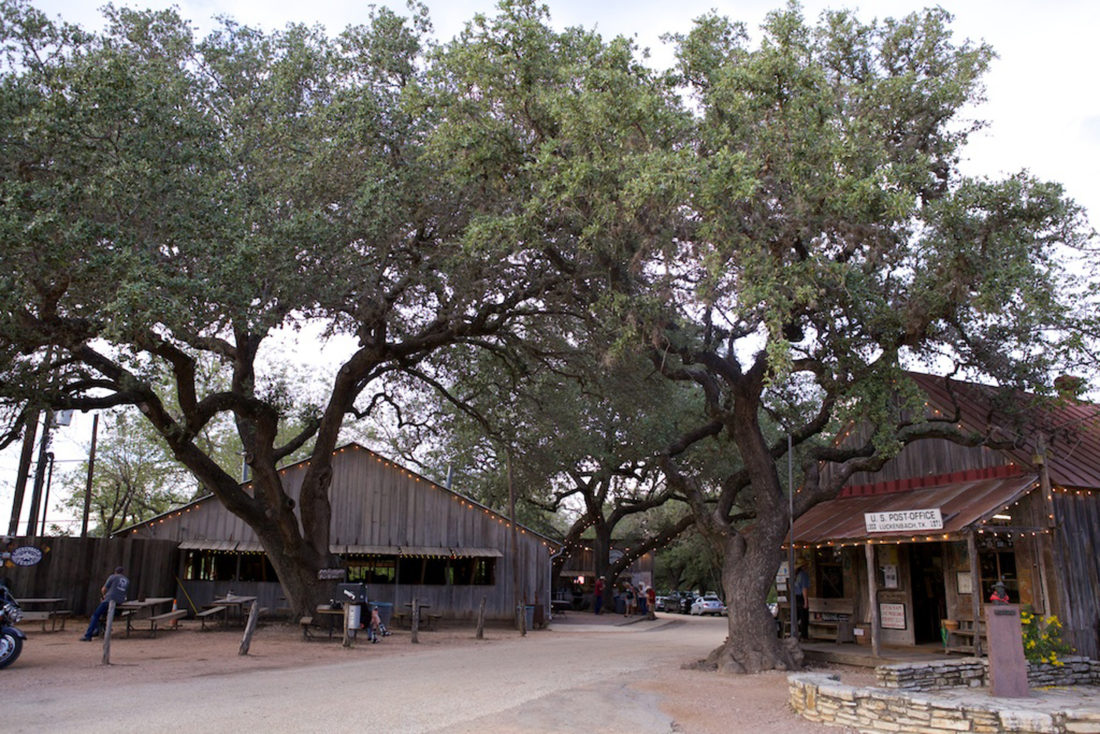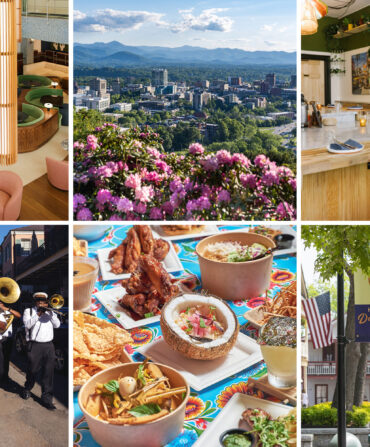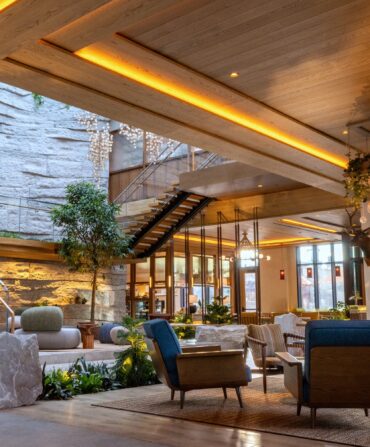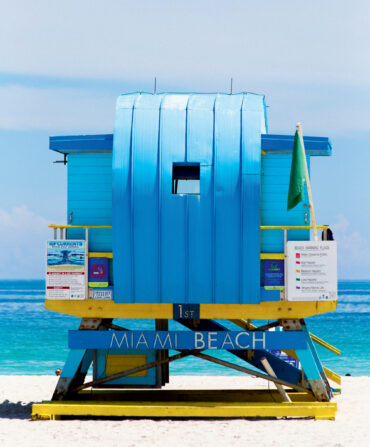A song is not a geographic place, but we all have songs that take us back there, wherever there was. I hear Van Morrison sing “Sweet Thing,” and I taste the Alaskan summer I turned twenty-one, opening the cabin windows every morning to his mountainous voice. And I feel hugely pregnant all over again—a somewhat alarming sensation—when I think of the January I walked hours along the San Antonio River with Emmylou Harris’s “Wrecking Ball” on repeat in my ears. These songs feel like old maps, but can a song also take you to a place you’ve never been?

Photo: Kate LeSueur
Historic marker.
I don’t actually remember when I first heard Waylon Jennings’s “Luckenbach, Texas (Back to the Basics of Love).” My mother loved country music, and the song was a number one hit theyear I turned six. Maybe she hummed it while she pushed me on our swing set? Maybe it was when I was riding in the back of the pickup truck out on my grandparents’ dairy farm? I feel like I’ve always known it, and when I grew up and moved to Texas, I took it with me. I’d lived here for nearly a decade, though, before I realized Luckenbach was an actual place, one just a short drive from the porch where I have more than once sat drinking beer and singing along, “Out in Luckenbach, Texas, ain’t nobody feelin’ no pain…”
https://www.youtube.com/watch?v=3dXR5Dk8YNw
But I never went. Neither did Bobby Emmons and Chips Moman, the Nashville duo that actually wrote the song. And Jennings didn’t visit until years after he first recorded it with Willie Nelson. The story goes that the legendary Texas songwriter Guy Clark once told them about Luckenbach’s classic old dance hall that sits beneath majestic live oaks along South Grape Creek, and it sounded like their idea of what Texas was supposed to be like. That was enough for them. It had been for me too, but eventually I’d played the song often enough in the car that my own young daughters knew all the words. One night I heard the eight-year-old in the bathtub belting it out: “I got my song, and I got you with me tonight…”
It was high time to go to Luckenbach, for real. When I put the word out to friends that I was looking to take a road trip, the little town’s air of myth only grew. One pal said that within a week of moving to Texas from Washington, D.C., she won an armadillo race out there. Another had once played chickenshit bingo there with real chickens and real chicken, uh, droppings. My friend Kelly looked at me in a way that seemed to say wear your boots, and watch your back, while my husband just repeated what I used to wonder, namely, “Is it even a real place?”

Photo: Kate LeSueur
Live music fills the dance hall nearly every night.
Luckenbach had an official population of three when the rancher and folklorist Hondo Crouch and two others bought the municipality in 1970. Crouch deemed himself the town’s “clown prince” and set about imagining a place where both music and magic got made, and by most accounts they did. The town’s website still quotes old Hondo: “If you find Luckenbach, you have to be looking for it.” Finally, one lazy Sunday afternoon, I loaded up all the versions of the song I could find—including Jennings’s classic and a surprisingly good one by Kid Rock and Kenny Chesney—onto a playlist and headed northwest from San Antonio on Sisterdale Road. Soon the suburban strip malls shifted to a hilly cedar horizon, herds of goats, and hamlets with shops that all spell house H-a-u-s.

Photo: Kate LeSueur
A longhorn steer serves as the unofficial mascot.
Nearly an hour and a half after leaving home, I was still looking. Apparently, people steal Luckenbach road signs as souvenirs. Just when I was starting to wonder if I’d been seduced to the middle of nowhere by a twangy cosmic joke, there appeared a sign for Luckenbach Town Loop. This small dirt road led to another sign with the words PARK YONDER. The parking lot, which is basically a gigantic field, seemed to date back to the late nineties when Willie Nelson’s 4th of July Picnic brought tens of thousands of fans. Today there were just a dozen cars, mostly trucks, and a few sedans with out-of-state plates. As I walked around the back side of the long wooden dance hall and through a split-rail gate, a man with an impressive mustache asked if I wanted my picture taken on a longhorn steer. When I declined, he asked where I was from, and I said “Here,” meaning Texas, but he looked skeptical. I looked down. Was it my clogs? I guess I should have worn boots.

Photo: Kate LeSueur
A sign for the shuttered post office hangs above the general store’s entrance.
It might also be that people still travel from a lot farther than I had come for a glimpse of what Texas is supposed to be like. And Luckenbach did look a lot like an Old West movie set, a gathering of just a few buildings with board-and-batten siding and faded red tin roofs. Above the door of the general store was the sign for the post office that hadn’t opened in more than forty years. I picked Sunday to visit because I’d been told there was good live music, but from the look of the calendar on the dance-hall door, live music was scheduled most every night, a mix of honky-tonk, bluegrass, old-time country, and singer-songwriter picking circles. I wandered into the bar in back of the store and looked at walls lined floor to ceiling with old photos, bumper stickers, neon signs, bandannas and caps, and a few preserved dead animals. The bartender shook her head firmly but kindly when I took out my credit card, so I paid for my beer in quarters. Back outside, sitting at the end of a picnic table near the creek, I met a real live German from the other Luckenbach, a lady from New Braunfels who sells raccoon penis bones, and a Chihuahua named Queso. I drank my Shiner Bock and ate some excellent curly fries. I thought I heard thunder, but it was just a group of guys on Harleys heading for the hills. When I turned back around, a banjo twanged and a man with a blue parrot on his shoulder winked as if we were in on a really good secret.
By early evening, nearly all the long dance-hall tables had filled with a discernible mix of tourists in running shoes, cowboys in boots, weathered biker couples, and young families. Clearly, Luckenbach was no secret, and I was far from the only one to be pulled here by the words of a catchy old song. Up on stage the man with the banjo kept singing about hearing a train in the distance but never being able to find it. A little girl stretched out in the middle of the dance floor and watched him, tapping the heels of her bright pink cowgirl boots together. Two people who looked as if they had been dancing together for a hundred years turned graceful circles around her. She may not remember where she was exactly, but she will remember being somewhere special, equal parts Wild West and theme park. To be honest, I’m still not sure if Luckenbach is a real place or not, or if I found what I was looking for, or even if I knew what that was, exactly. I do know that between the warm air, the cold beer, and the lingering sounds of good music and laughter that followed me home, I didn’t really care.
Wear your boots. Bring some cash. And take your time. Luckenbach isn’t going anywhere.








